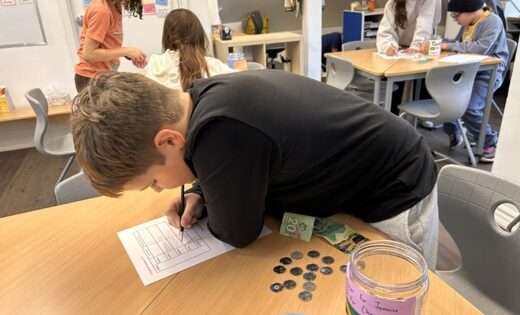on
BY KAHA GEDI
“I gyatt to steal that donut in yo hand! After all, as a Skibidi sigma alpha wolf, fanum taxing your food is important because galvanized square steel is so rare nowadays. My blood sugar is running low, and if I don’t get these paws on it, I’m SO cooked, no cap. I’m gonna stop yapping so hand it over now, lil bro. -1000000 aura.” – An example presented by my 15-year-old friend (IN HIGH SCHOOL, MIND YOU)
Translation: I gotta get that donut in your hand! After all, as a cool, powerful leader/person (though there’s no exact translation), taking your food is important. My blood sugar is low, so if I don’t get my hands on it, I’m screwed, no joke. I will stop talking now so hand it over now, younger person.
These are a couple of sentences I’ve asked my friend to write for me, because I didn’t understand how to use these words, and she’s gone too far to be saved. So, if you didn’t understand what she wrote, then fortunately, there’s still hope for you. If you’re wondering why, it all sounds like a bunch of mumbo jumbo, that’s because it is.
In this day and age, Gen Alpha, and probably a few Gen Zs are adopting what I call good ol’ brain rot. It consists of memes on the internet, random phrases, Roblox games, and famous YouTuber terms. These terms have been on the rise recently and unfortunately have even been mentioned by an independent senator in Australia. So now, I welcome you, my dear reader, into the infinite world of brain rot.
What do these terms even mean?
According to some sources, and my definitions, here is a quick glossary:
- “Chat”: A generic term of address for an audience; a sort of plural “you” born of online content creators who stream videos of themselves gaming, in which they address live viewers who provide commentary in the chat section.
- “Fanum Tax”: stealing food between friends, based on the username of Twitch streamer Fanum.
- “Gyatt”: a big behind or butt. You would say this about someone’s appearance. (Please don’t)
- “Ohio”: crazy, strange; based on funny stories from Ohio.
- “Rizz”: is short for charisma. See also: “Rizzler” for a charming person. There are three types of rizz, “W Rizz,” “L Rizz,” and “Mid Rizz.”
- “Sigma”: Cool; adapted from an online subculture of boys who don’t identify as either “alpha males,” who are successful with women, or “betas,” who they believe are weak. Usually used in the sentence, “What the sigma?” which means “Seriously?” or “Are you kidding me?”
- “Skibidi or Skibidi Toilet”: the website I used didn’t even try to define this one, however, it’s a game on Roblox. Search it up if you dare.
- “Aura”: Cool points, if you lost aura then that means you did something embarrassing or things close to that, and if you gained aura, you did something cool or good
- “Yapping”: talking too much, another form is yappachino. For example, if someone is talking too much; to everyone’s horror somebody could say, “I didn’t order a yappachino.”
- “No cap, or just cap alone”: No joke, or I’m not lying, or seriously
- “Mewing”: This is not a saying, but an action, it is when you press your tongue to the roof of your mouth to improve or show off your jaw. To kids nowadays they do a shushing accent and then run the finger along the jaw while making a “handsome” face.
- “Mogging”: Outshining the rest, to look so attractive you make others look bad in comparison. Typically, with a sharp jawline.
Independent Senator using these words to gain their attention.
What baffles me is that it’s gotten to a point where Fatima Payman, an Independent Senator in Australia is using this to communicate to Gen Z and Alpha. In her speech, she says:
“To the sigmas of Australia, I say that this “goofy a” government has been capping, not just now, but for a long time. A few of you may remember when they said, ‘There’ll be no fanum tax under the government I lead.’ They’re capaholics, and they’re also yappaholics. They yap non-stop about how their cost-of-living measures are changing lives for all Australia. Just put the fries in the bag, lil bro. They tell us that they’re locked in on improving the housing situation in this country, but they must have brain rot from watching too much Kai Cenat and forgot about their plans to ban social media for kids under 14.”
“If that becomes law, you can forgo “skull emoji” all about watching Duke Dennis or catching a dub (win) with the bros on Fort (Fortnite). Chat, is this prime minister serious? Even though he’s the prime minister of Australia, sometimes it feels like he’s the CEO of Ohio. I would be “taking an L” if I didn’t mention the ops (cops/people out to get you/bad people) who want to cut WA’s gyatts and services tax. The decision voters will be making in a few months will be between a mid-government, a dog water opposition, or a crossbench that will mog both of them. Though some of you cannot yet vote, I hope when you do it will be in a more goated Australia for a government with more Aura, Skibidi.”
What concerns me most is that she’s talking to people who can vote, which means that the Gen z’s that are around maybe 19-25 are speaking like this.
The rise of “brain rot” among Gen Z and Gen Alpha serves as a reminder of how quickly language can evolve—and sometimes devolve. While the creativity of slang can make a sense of community, we must be cautious about its potential to erase our fundamental skills.
It’s crucial for parents and teachers to encourage a balance between embracing new forms of expression and maintaining clarity in language. Vocabulary is the foundation of effective communication, and when we allow these words to mess up our flow then we should stop and think, “Should I really be saying this?”
Stay in the loop with exclusive news, stories, and insights—delivered straight to your inbox. No fluff, just real content that matters. Sign up today!














steven kaszab
October 17, 2024 at 12:00 pm
It is difficult not pointing ones fingers towards those who are suppose to be educating our kids, as too the students who seem to have been wasting their time and the teachers efforts in the pursuit of education. Have either of them read these days, books not their tablets and phone screens. I recently had a conversation with a graduate of a ivy league university in the USA. His diction, pronunciation and ability to put two words together showed me a disturbing trend within his generation. Laziness with no apparent understanding of why they need to be truly educated stands out, as to their lack of personal tenacity in learning the three R’s. Computerized A.I. do everything for them, from essays, research and methodology of how to perform. Yes I am talking about both teacher and student.
Liana
May 2, 2025 at 9:37 am
thanks for info.